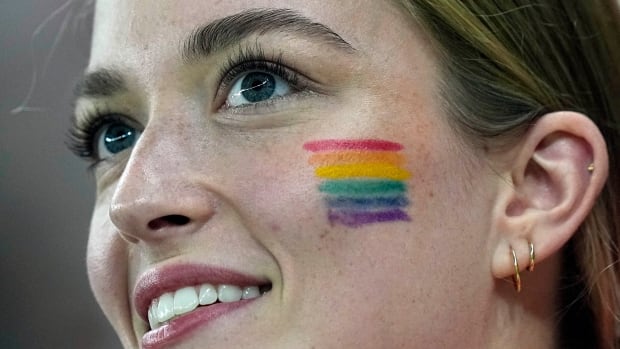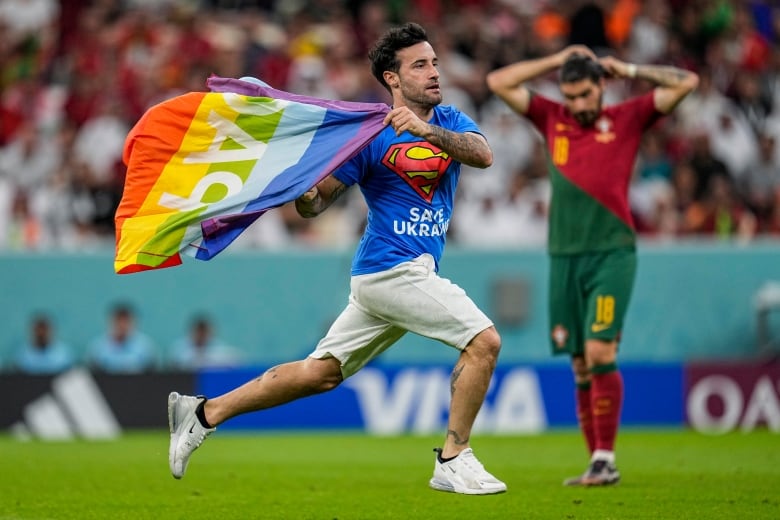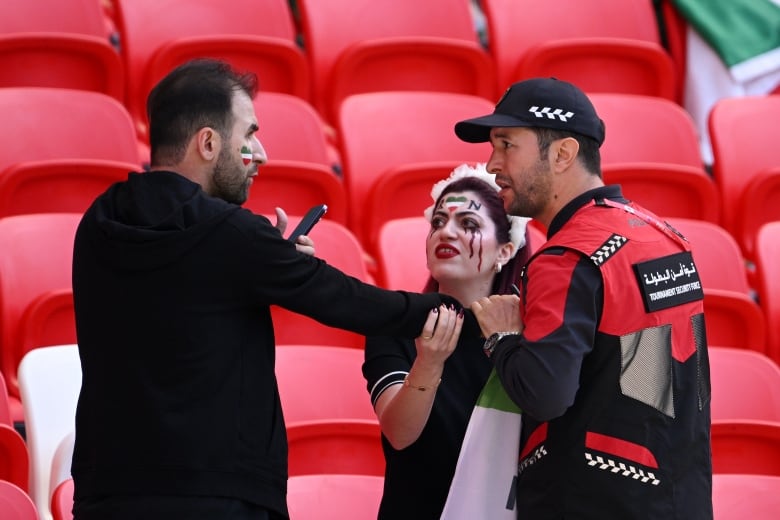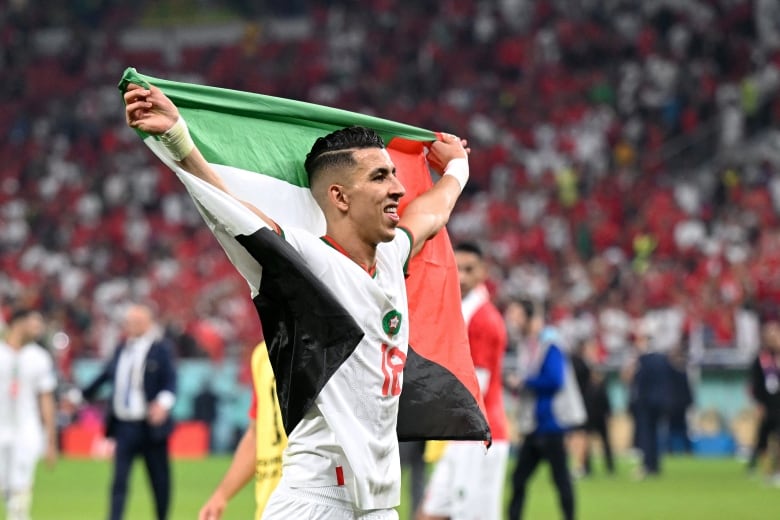
For much of its nearly 100-year history, the World Cup has been a clash of sport and politics — though perhaps never so much as at this year’s tournament in Qatar.
Despite organizers’ best efforts to get players and fans to focus on the soccer, the current men’s World Cup has faced enduring accusations. They’ve been accused of “sportswashing” over the host’s human rights record, with spectators detained and teams threatened over rainbow flags. It has left long-time observers wondering if FIFA has lost control of its own event.
Here’s a look at the times politics and sports collided at the 2022 men’s World Cup:
A controversial host
With its tiny population, extreme heat and lack of footballing history, the choice of Qatar as this year’s World Cup host had long raised eyebrows.
Days before the tournament opened on Nov. 20, former FIFA president Sepp Blatter said it was “a mistake” to choose Qatar, in part because of its small size — adding that the event should have instead gone to the U.S.
On the eve of the opening ceremony, FIFA president Gianni Infantino delivered a 57-minute tirade, demanding critics stop talking about politics and human rights, and instead enjoy the soccer. Infantino has since kept a low public profile.
The plight of migrant workers
Exploitation of migrant workers, including those who built Qatar’s stadiums and infrastructure, has been a dark cloud over its World Cup, with some former labourers detailing slave-like conditions with low pay and little time off.
Hassan Al Thawadi, the head of Qatar’s World Cup organizing committee, brushed off the recent death of a migrant worker at a training site by saying: “Death is a natural part of life.” Another worker died in a fall at a stadium on Saturday.
Al Thawadi previously said between 400 and 500 migrant workers died during World Cup construction projects.
Removing rainbows
World Cup organizers took extraordinary steps to try to keep rainbow flags and clothing out of stadiums, amid criticism over Qatar’s anti-LGBTQ laws. Fans had items confiscated, and some were even removed from stadiums or detained for wearing rainbow clothing.
The captains of seven European teams abandoned a plan to wear rainbow armbands during matches after FIFA threatened them with yellow cards. In a joint statement, the teams said they couldn’t risk their success at the tournament by taking a stand (two yellow cards would result in a player being sent off and banned from the team’s next game).
Before their opening match, Germany’s players posed for a team photo with their mouths covered, in reference to being gagged by FIFA over the armbands.
Nonetheless, a rainbow did make it onto the pitch, when a protester carrying a peace flag interrupted a match between Portugal and Uruguay.
The flag is an unofficial symbol of world peace, which was created in Italy in 1961 and carries the word “PACE,” which is Italian for peace.

Protesting Iran’s regime
Iran’s flag also became a contentious motif during the country’s games. Security guards confiscated Persian pre-revolutionary flags and signs bearing messages of support for Iran’s protest movement. There were also confrontations between protesters and supporters of the Iranian regime.

But some ticket-holders did manage to carry flags, T-shirts and signs into stadiums, and they held up messages referring to women’s rights and Mahsa Amini, the 22-year-old woman whose death in Iranian custody in September sparked the country’s massive protests.
Iran’s soccer team stood silently during their national anthem, ahead of their opening match, in a sign of support for the protests back home. However, they sang the anthem at their next match.
Iran’s group stage face-off with the U.S. was shaping up as a geopolitical event, even before U.S. Soccer posted an altered version of Iran’s flag — without its Islamic Republic emblem — on social media. The U.S. Soccer Federation later said the post was a show of support for Iran’s protest movement.
Iranian state media called for Team USA to be kicked out of the World Cup, while the U.S. team’s coach and captain were grilled by Iranian journalists over the flag image, geopolitics in the Persian Gulf, and their pronunciation of “Iran” as “eye-ran”.
Palestinian flag on display
The flag of the Palestinian territories has been a regular sight in the stands and on the pitch at this year’s World Cup — the first to take place in the Middle East — even though their team isn’t playing.
On Nov. 30, a man waving a Palestinian flag ran onto the pitch during Tunisia’s game against France.
And when Morocco reached the quarterfinals, it wasn’t their own flag they posed with. Instead, they celebrated with a Palestinian flag.

Canada’s goalie faces discrimination
FIFA disciplined Croatia’s team after its fans taunted Canadian goalkeeper Milan Borjan during the two teams’ group stage clash on Nov. 27.
Borjan was born in an ethnic Serb region of Croatia that was part of the conflict that split the former Yugoslavia in the 1990s. During the match, Borjan faced abusive chants and banners making light of his family’s escape from their hometown when it was taken by Croatian forces in 1995.
In a statement on its website, the Croatian Football Federation said FIFA’s disciplinary committee had fined it 50,000 Swiss francs ($72,600 Cdn) for its fans’ inappropriate behaviour.
Beery bad news
Two days before the World Cup opened, Qatar — which has very strict alcohol control — announced it would not allow beer to be sold in stadiums. Instead, it could only be sold in fan zones and some other approved sites.
The news came as a shock to FIFA, ticket-holders and Budweiser alike. The beer giant has been a World Cup sponsor since 1985. It’s unclear whether it will sue World Cup organizers for breaching their multimillion-dollar contract.
The company quickly came up with another way to offload all the beer it took to Qatar: give it to the winning team.
New Day, New Tweet. Winning Country gets the Buds. Who will get them? <a href=”https://t.co/Vv2YFxIZa1″>pic.twitter.com/Vv2YFxIZa1</a>
—@Budweiser